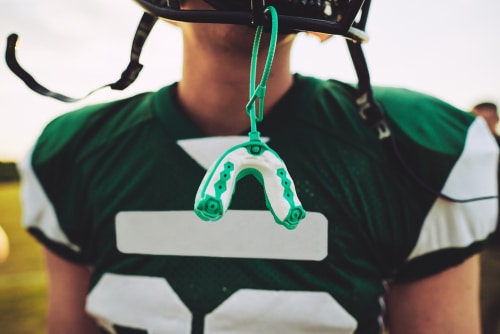As summer sets and autumn is starting to appear on the horizon, it is time to consider the activities that your child will participate in this year and what sort of safety equipment they need. More specifically, will your child need an athletic mouthguard? According to the American Dental Association, 84% of children do not wear a mouthguard during athletic activities. We know that mandatory use of a protective mouthguard is required by many sports but not all. Sports like football, lacrosse, and hockey, for example, typically require the use of a mouthguard. However, it is the sports that do not require the use of a protective mouthguard that often sees more dental-related injuries.
Studies show that the highest number of dental-related injuries in children ages 7-17 occur while participating in baseball and basketball. And for non-organized sports like skateboarding and riding bicycles, dental trauma is the highest. Maybe it is because sports like football require the athletes to wear a protective mouthguard that we do not see a higher incidence of dental injuries; or, maybe we need to have our children wear protective mouthguard during other activities. It may sound ridiculous to have your child wear their mouthguard before skateboarding, but keep in mind that the average lifetime cost of a dental-related injury can exceed $20,000 over the course of their life.
While many organized sports do not require the use of an athletic mouthguard, it is prudent to consider this option as a reasonable treatment for your children. Up to 60% of athletes report having a sports-related dental injury. With that in mind, If your children are planning to participate in sports activities this school year, especially contact sports, it may be best for them to get mouth guards. Those who do not wear any mouth guards are 70 times more prone to sustaining a dental injury when participating in contact sports.
How do mouth guards work?
Mouth guards are a thermoplastic polymer rubber material that serves to add a protective layer between the teeth. The thickness is an important aspect of the material, and custom mouth guards that are at least 3mm play a significant role in reducing dental injuries. Custom mouth guards fit better than traditional boil-and-bite mouth guards, do not affect breathing and have the option of being clear for the sports that do not require mouth guards as protective equipment.
Can mouth guards be used by kids with braces?
Yes. In fact, we recommend that anyone undergoing orthodontic therapy that participates in athletic activities should wear a custom mouthguard. These can be fitted to accommodate for braces and decrease the likelihood of dental injuries significantly. People with braces often suffer more injuries related to activities that result in cuts in the mouth, broken brackets and broken wire. Wearing a mouthguard can avoid these unnecessary issues.
How do custom mouth guards differ from store-bought?
Our office fabricates custom mouth guards which can be created in such a way that the fit is accurate, streamlined, and comfortable. You can also purchase store-bought mouth guards at most athletic stores. However, keep in mind that custom mouth guards are far superior in every way to the traditional boil-and-bite mouth guards that you purchase at a store.
Dental mouth guards have been proven to prevent expensive and unnecessary dental injuries. They are an affordable way to preserve the integrity of your child’s mouth. Also, research supports that a custom mouthguard does not inhibit breathing and fits better than traditional boil-and-bite mouth guards. Call our office today so that we can fabricate a custom mouthguard for your child.

